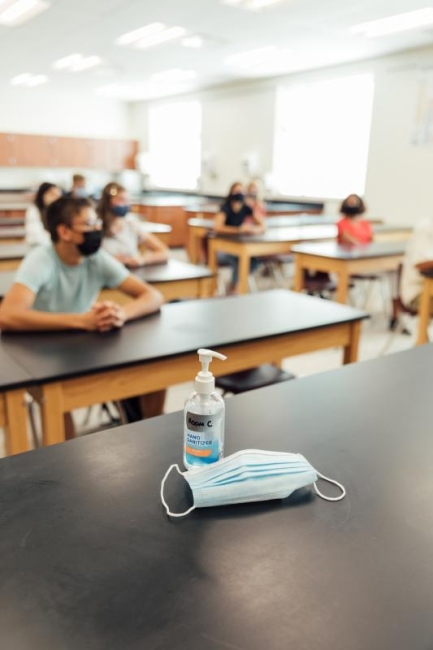You have /5 articles left.
Sign up for a free account or log in.

Richvintage/E+/getty images
After a year or more on Zoom, students and professors have actually been meeting in person for the first time these past weeks. As we began the semester, we quickly realized that we were not only here to learn a subject or a specific skill set—in this case it was an upper-level workshop on writing the short essay. No, this semester we also had to learn what it meant to be back in something like “real college” after nearly 18 months of the pandemic had warped and twisted the experience into something else altogether.
“Wasted time” doesn’t feel like an accurate descriptor of the last year and a half—“stolen time” does. Now, we’re trying to make up for it. We’ve spent a few minutes at the beginning of each class venting, raging, reflecting or just muttering in disbelief at one facile detail or another from the daily grind.
We’re still in the thick of the pandemic—a fact we are aware of each day as we make eye contact over our masks, as we report our symptoms and test results, as we sit in assigned seats for the sake of more efficient contact tracing. But we’re also back in the classroom, struggling to regain some sense of normalcy. So how does it feel now to be learning again or, at least, learning the way that many of us signed up for originally—in person? Here’s what we’ve found.
- Multitasking bleeds in. We’re so used to toggling between numerous things—not just classes but ordinary tasks, too. Cooking breakfast while listening to a Zoom lecture. Cleaning the bathroom while participating on a discussion board. Watching a slideshow for class with Tiger King streaming in a juxtaposed online window. That doesn’t end, at least not psychologically, even when we’re back in the quiet, contemplative classroom. We have a palpable, weird collective itch to do more—even when we’re just sitting together in class, ostensibly focused on a singular topic.
- Learning has become a chore rather than a fulfilling process. Learning used to be something everyone was used to, even if it varied significantly from class to class, from student to student—it was much more engaging as such. Learning used to happen across instructors and peers; it was a matter of camaraderie. With the pandemic, learning became mostly memorization and assignments, just items on a to-do list that had to be checked off. Even now that we’re back in person, we’ve found it harder to find motivation and inspiration when everything is still so uncertain. In fact, many of us have fallen into the mind-set of simply crossing the finishing line to graduation.
- Bodies are more than just butts in seats. They’re also risk factors, potential vectors for the next variant. After a year of pandemic paranoia, we can’t trust the people we know, let alone those we don’t. When someone coughs, we all look their way. Dodgy mask wearing can make us misanthropic. Fake vaccine cards and PCR tests circulate, further eroding trust. Sometimes we can’t even trust ourselves. This erosion of trust makes the classroom—a place we used to trust as a baseline for learning—incredibly strange. The recent Marvel show Loki was prescient in its deployment of “variants” as antiheroes—little did we know that we’d all become such viable rogues in everyday life by late 2021.
- The line between work and personal life is blurrier than ever. We’ve spent almost a year working from home or doing “essential” work that we now find it infinitely more difficult to balance free time with classwork and other academic responsibilities. Going to class feels like a strange breach in contract: it’s not quite work, yet it’s not exactly personal time, either.
- Neither option feels right. We thought being back in person would be a step toward normalcy. It hasn’t been. That said, with online learning, we remained trapped in rooms with the screens of our computers serving as peepholes into the outside world (and back into ours). It’s unclear which is worse: being in person and risking infection yet getting the education we’d come to expect, or being online and knowing we’re safe but not sane.
- The workload has multiplied. There is an atmospheric notion that additional studies must be done to make up for classes not being in person for so long, but the result is that everyone is drowning in work. Extra work is assigned; papers pile up to be written, then graded; deadlines cascade.
- It’s a haunted house. The campus feels spooky. It offers no sense of long-term stability, that being back together in class will remain the way things work from now on. Instead, we all hover in the uneasy sensation that this can all go away at once—that the reality we live in today will soon break down. All it takes is one more case, or a new variant, and we will all revert back to a purely virtual presence. So we are mere ghosts haunting our own present, wandering the halls of buildings that no longer project permanence.
- Everyone is on the verge of a breakdown. It had been getting this way for a while, with people’s mental health spiraling downward and campus shootings on the rise. But now it’s just expected and understood: everyone is just one minor event away from snapping. COVID scares can trigger existential crises and then ripple effects. Why ask each other “How are you?” when nothing has changed in almost two years? The surface tension is always about to give, somewhere or somehow.
- Our lowest points have become our new normal. The longer the pandemic lasts, the more hopelessness permeates. For every vaccine, a new threat emerges. And for every period of lowered COVID rates, a spike of cases lurks around the corner. As the cycle becomes internalized, the mental instability that comes packaged with it is normalized, along with a collective feeling of a kind of nihilism. Most people under 40 are keenly aware that the planet is rapidly doglegging into catastrophe. As we try to return to normalcy, it becomes apparent that nothing will ever be normal again. Disillusionment and despair used to be safely contained in certain strains of Western philosophy—something we could cover in specific classes. Now, it’s just daily life, a part of every course.
- We’ve seen the man behind the curtain. The pandemic has made it abundantly clear how jury-rigged the systems in place are—how close our society is at any given moment to collapsing (or at least seizing up). We know we’re at the mercy of whatever happens next, and that it’s always bigger than us. We appreciate our university’s steady leadership during this chaotic time. But the feelings of precarity in the actual classroom linger on. We’re not in Kansas anymore, but how can we get out of Oz?
We’re supposed to be happy to return to the campus. Seeing friends—physical people—in class has been a minor relief. We now realize that learning from one another in person cannot be virtually replicated. And it actually feels like we have “classes” again.
But mostly our heads hang low, and our eyes focus on busy feet carrying us from class to class. Masks cover the exchanges of polite smiles, muffled hellos, mere acknowledgment. The urge to withdraw is strong, to do what is comfortable/easy/what we know: stay home. Social withdrawal is compounded by social distancing and its uneven afterlife. After nearly two years of being insular, it’s difficult to shift into a classroom dynamic. It’s just as hard to leap back into a social dynamic, reconnecting with friendly acquaintances we were once so used to seeing on a daily basis.
If the classroom is a minefield, it’s because the campus and communities beyond are ravaged war zones themselves. And when the classroom feels vulnerable, unsafe or just in drawn-out ambiguous limbo, everything else about the college experience feels off-kilter.
For the past two years, we have existed mostly inside the confines of our homes as we’ve tried to navigate the new world. We have not grown as a community, we have not grown individually—and yet the world kept spinning, the semesters unfolding. The place that has been our educational abode for four years feels like an alien planet these days, and none of us know how to phone home.







